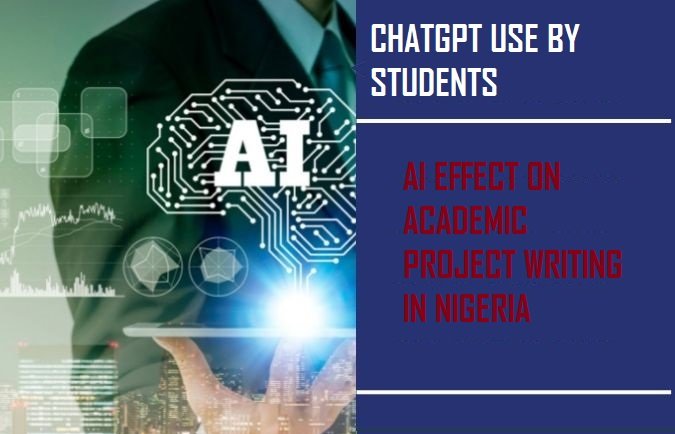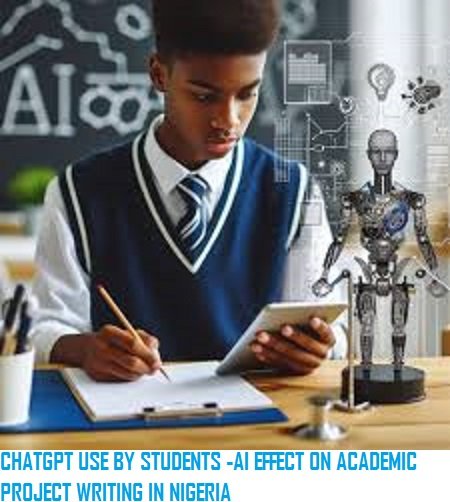- June 12, 2024
- Posted by: Igbaji Chinwendu
- Category: Project Writing Guide

CHATGPT USE BY STUDENTS -AI EFFECT ON ACADEMIC PROJECT WRITING IN NIGERIA
Contents
There has been substantial advancement in artificial intelligence (AI) as well as its impact on various aspects of human endeavors. One of the most recent AI is ChatGPT which is currently transforming the academic landscape, especially in research and academic writing.
Thus, it is essential to understand how AI has impacted academic project writing in Nigeria. In this context, you will learn the benefits, disadvantages, and limitations of AI in academic project writing.
What is ChatGPT?
ChatGPT is a sophisticated language model created by OpenAI. It is developed on the generative pre-trained transformer 3 (GPT-3). Based on the input it receives, it is designed to comprehend and generate texts similar to humans.
It can also be viewed as AI trained on a wide range of textual information on the Internet, allowing it to create articulate and contextually significant answers to a broad range of queries.
Benefits/Positive Impacts of ChatGPT on Academic Project Writing
ChatGPT have several beneficial impacts on academic project writing, both globally and in the Nigerian context. Below are the various benefits of ChatGPT in academic project writing.
Improved efficiency: ChatGPT has become an indispensable tool for academic project writing as it assists researchers and students in generating content at a faster rate, thus ensuring students are able to finish their academic projects within a specified timeframe.
This is possible because AI can generate quick insights about a research topic, generate sample texts, and assist students with complex and perplexing areas. This efficiency boosts students’ allocation of time for other vital parts of their research projects.
Enhanced Language Proficiency: Frequent interaction with ChatGPT assists in improving students’ language skills. Through consistent interaction with the tool, students learn novel writing styles, new sentence structures, and new vocabulary.
Such exposure to high-quality outputs has the capacity to improve the general quality of their research projects.
Effective proofreading: ChatGPT’s ability to develop articulate and error-free texts makes it an invaluable proofreading tool. It can spot grammatical or spelling errors and suggest alternatively improved versions.
This feature assists researchers and students in refining the final draft of their academic project before publication or submission.
Access to information: ChatGPT acts as a source of knowledge due to its ability to provide information in various academic domains.
Its ability to provide factual answers to questions and verifiable meanings/definitions of concepts makes it an indispensable tool for academic project writing. This information access assists students in getting relevant information for their academic research projects and assignments.

Disadvantages/ Negative Impacts of ChatGPT on Academic Project Writing
Although ChatGPT have some beneficial impacts in academic project writing, it also has some disadvantages. These disadvantages are highlighted and discussed as follows.
Risk of plagiarism: Despite being able to generate original texts, ChatGPT has caused students to commit plagiarism unintentionally, especially if they directly copy and paste the AI’s output into their research projects without paraphrasing and proper citation.
Thus, it is important for students and researchers to critically examine and verify the output from the AI to guarantee its originality and prevent academic misconduct.
Moreover, using AI in academic writing is now becoming a very critical offence when detected in academic submissions. Thus, at best it should be used for gaining insights more than generation of content for any form of academic writing as its detection is also an academic offence.
Absence of Domain Expertise: ChatGPT is regarded as a general-purpose language, thus it lacks expert knowledge in particular academic fields. Hence, although it can generate information, such information may be limited because it may lack the capacity to provide comprehensive and accurate insights into sophisticated fields.
Consequently, depending solely on ChatGPT for specialized content may lead to imprecise and incomplete comprehension.
Quality inconsistency: Although ChatGPT can generate high-quality information, it lacks perfection in most cases and can frequently produce imprecise or insensible responses.
Thus, students who depend completely on its output without proofreading properly can end up with erroneous content that can negatively impact the quality of their academic projects.
Limitations of ChatGPT in Academic Project Writing
Having explored the positive and negative impacts of ChatGPT in academic research writing, it is critical to discuss some of its limitations which can be a major contributing factor to its negative impacts.
Restricted Contextual Understanding: ChatGPT functions on a sentence-by-sentence basis, so it may lack an in-depth comprehension of your research context. This limitation can result in erroneous feedback when faced with complex or sequential questions demanding contextual familiarity.
Undependable Source Assessment: although ChatGPT can generate information, it lacks the capacity to examine the reliability and credibility of sources. That is when, even if it provides links or sources of information, such sources cannot be verified on any platform.
Thus, researchers and students need to exercise caution when using information generated by ChatGPT and carry out an independent assessment by verifying it via authoritative academic sources.
Ethical issues: ChatGPT, like any other AI model, is trained on vast datasets that can possess data biases. This can affect its responses and possibly instigate biases or inequitable content.
Thus, users should be conversant with these ethical issues and conduct a critical assessment of the model’s outputs to guarantee their compliance with ethical principles.
Thus, given these downsides, it is advisable for users to use ChatGPT as just a tool while using their critical thinking skills to conduct independent assessment and verification of its output to guarantee the quality and integrity of their research projects.
